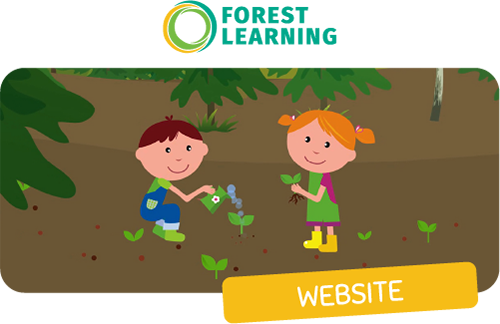
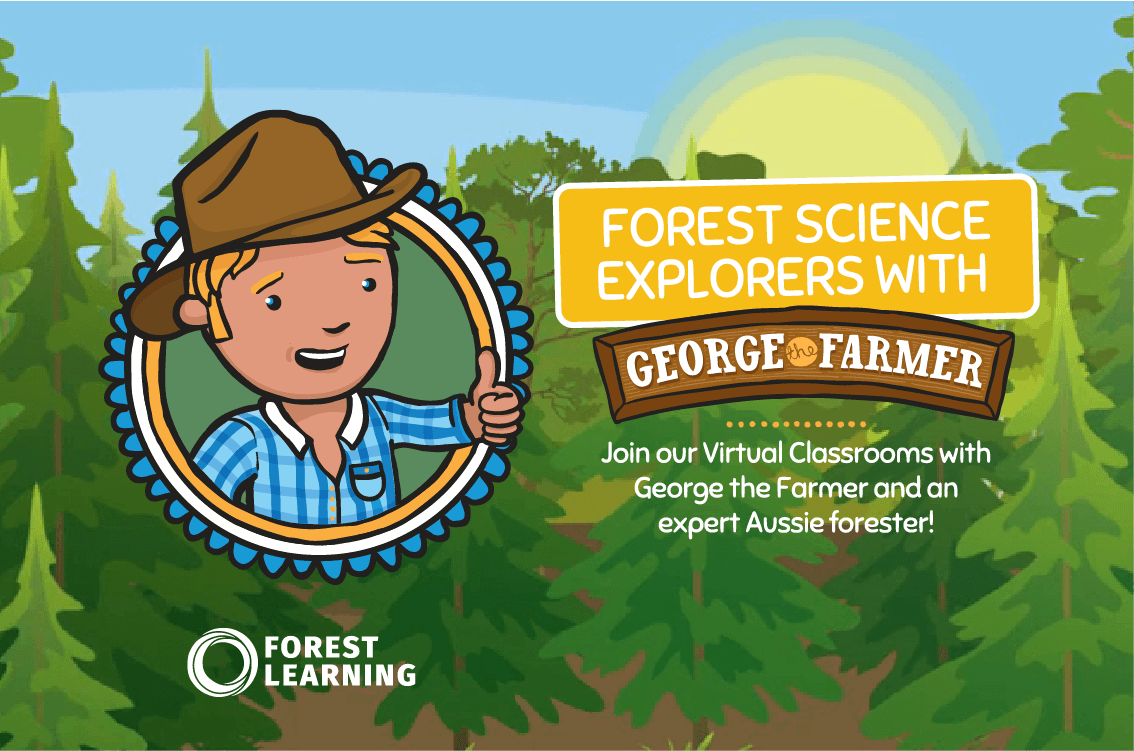
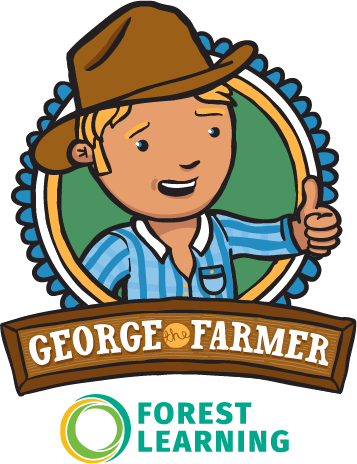
ForestLearning is excited to invite your class to a free, live session on forests and the renewable resource of wood!! Hosted by a qualified teacher, these 30 minute curriculum-linked sessions provide a perfect introduction to topics such as where does our wood and paper come from, what does a forester do, what is a renewable resource, what is the lifecycle of a tree, and what role does technology play in the forestry industry.
Easily accessible from the classroom, or at home through Zoom, there is no limit to the number of students who can join the sessions. Specifically created for lower primary students in Foundation to Year 4, these virtual classroom sessions feature interaction opportunities such as Q&As with our experts, sing-a-longs with George the Farmer, and quizzes!
Don’t miss out on this awesome series of free, live, interactive sessions connecting your class to an expert forester.
Just LOG-ON and LEAF the learning to us!
Term 3 Sessions
2022-07-28 10:00:00
2022-07-28 14:00:00
Term 4 Sessions
2022-10-25 11:30:00
2022-10-25 14:00:00
Resources
Access our free curriculum-linked teaching resources, available on the ForestLearning website.
Resources include lesson plans, activities, videos and VR, and more!

The first 30 schools to register and attend the Virtual Classroom receive a FREE CLASSROOM EXTENSION PACK containing a class set of Tree Carbon Storage Tape Measures and a Biodiversity Planting Kit for their school! All schools who attend the Virtual Classroom will receive a ForestLearning teachers' pack.
Australian Curriculum Links
Year Level |
Science |
HASS (Geography) |
|---|---|---|
|
F |
Living things have basic needs, including food and water (ACSSU002) |
The places people live in and belong to, their familiar features and why they are important to people (ACHASSK015) The reasons why some places are special to people, and how they can be looked after (ACHASSK017) |
|
1 |
Living things live in different places where their needs are met (ACSSU211) Science involves observing, asking questions about, and describing changes in, objects and events (ACSHE021) People use science in their daily lives, including when caring for their environment and living things (ACSHE022) |
The natural, managed and constructed features of places, their location, how they change and how they can be cared for (ACHASSK031) Activities in the local place and reasons for their location (ACHASSK033) |
|
2 |
Different materials can be combined for a particular purpose (ACSSU031) People use science in their daily lives, including when caring for their environment and living things (ACSHE035) |
Reflect on learning to propose how to care for places and sites that are important or significant (ACHASSI042) The connections of people in Australia to people in other places in Australia and across the world (ACHASSK050) |
|
3 |
Living things can be grouped on the basis of observable features and can be distinguished from non-living things (ACSSU044) Science involves making predictions and describing patterns and relationships (ACSHE050) Science knowledge helps people to understand the effect of their actions (ACSHE051) |
Pose questions to investigate people, events, places and issues (ACHASSI052) The main climate types of the world and the similarities and differences between the climates of different places (ACHASSK068) |
|
4 |
Living things depend on each other and the environment to survive (ACSSU073) Natural and processed materials have a range of physical properties that can influence their use (ACSSU074) Science knowledge helps people to understand the effect of their actions (ACSHE062) |
Examine information to identify different points of view and distinguish facts from opinions (ACHASSI077) The use and management of natural resources and waste, and the different views on how to do this sustainably (ACHASSK090) |
Cross-curriculum Priorities - Sustainability
OI.3 - Sustainable patterns of living rely on the interdependence of healthy social, economic and ecological systems.
OI.4 - World views that recognise the dependence of living things on healthy ecosystems, and value diversity and social justice, are essential for achieving sustainability.
OI.7 - Actions for a more sustainable future reflect values of care, respect and responsibility, and require us to explore and understand environments.
Expert Profiles
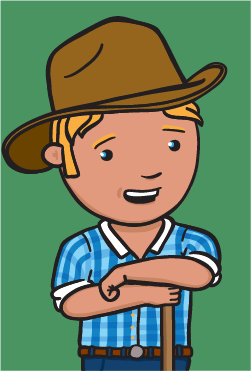
George the Farmer’s vision is a world where kids connect to the earth, food and farm. Based in regional SA, the George the Farmer team create fun picture storybooks about agriculture, music and paddock-to-product videos that can be viewed on YouTube and ABC iView.
Curriculum-aligned educator's guides for F-4 are also available via their website.
www.georgethefarmer.com.au
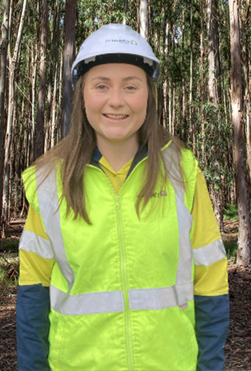
Kelsey is an environmental forester based in Hamilton Victoria. An environmental forester looks after all of the areas of forest which aren't the plantation trees. Kelsey loves exploring and seeing what animals she can find living in the forests, waterways and wetlands. She makes sure that all of the flora and fauna in the forest are healthy and happy.
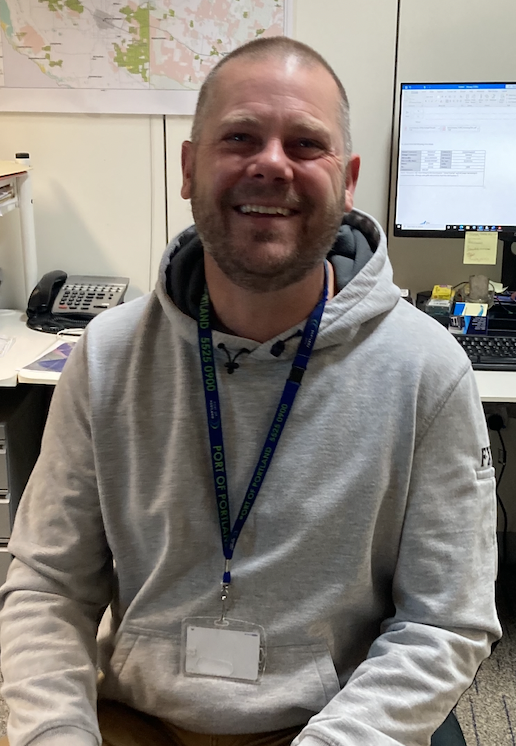
Greg is based in Mount Gambier in South Australia. He loves trees and is passionate about growing the only carbon positive and fully sustainable and renewable building material in Australia - wood. He is a harvesting forester and it’s his job to make sure people are kept safe during a harvesting operation, and that all the trees harvested are the best possible for the timber mills to turn these round logs into rectangular timber products. Greg loves sharing his passion for forestry with younger generations.
